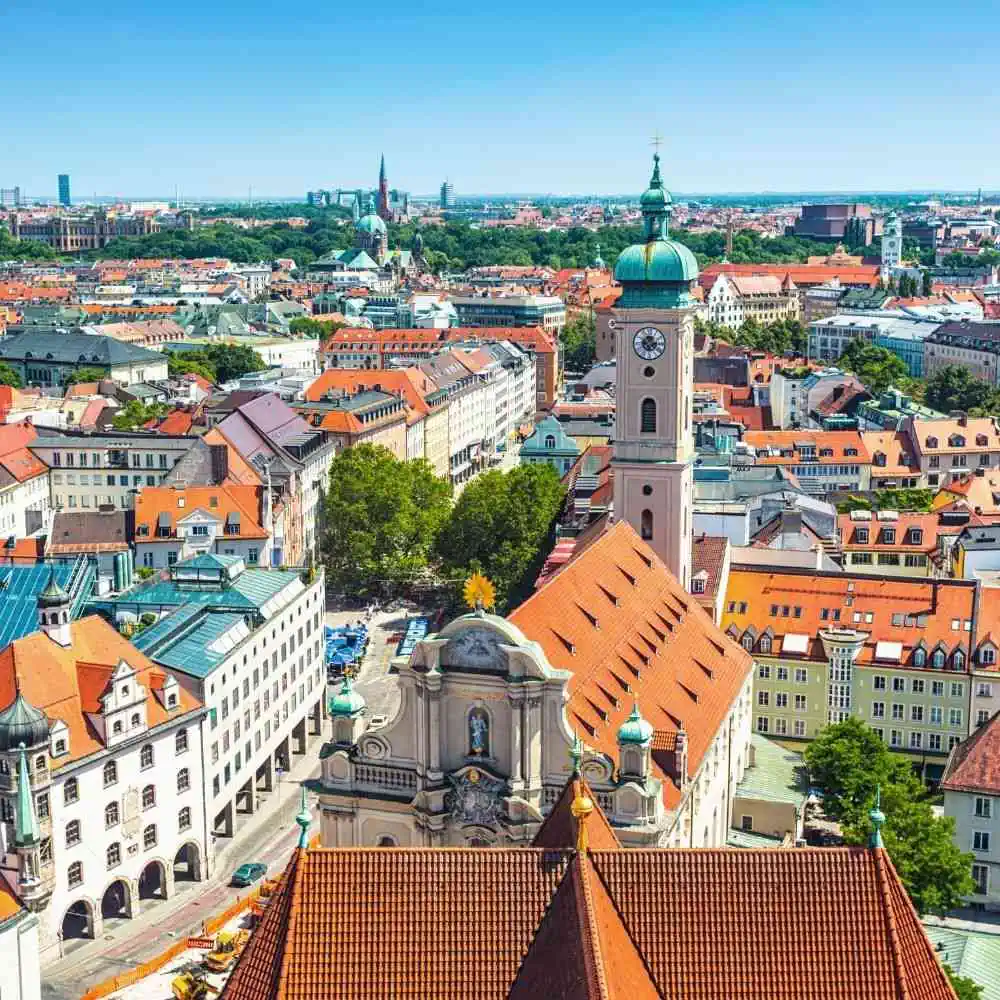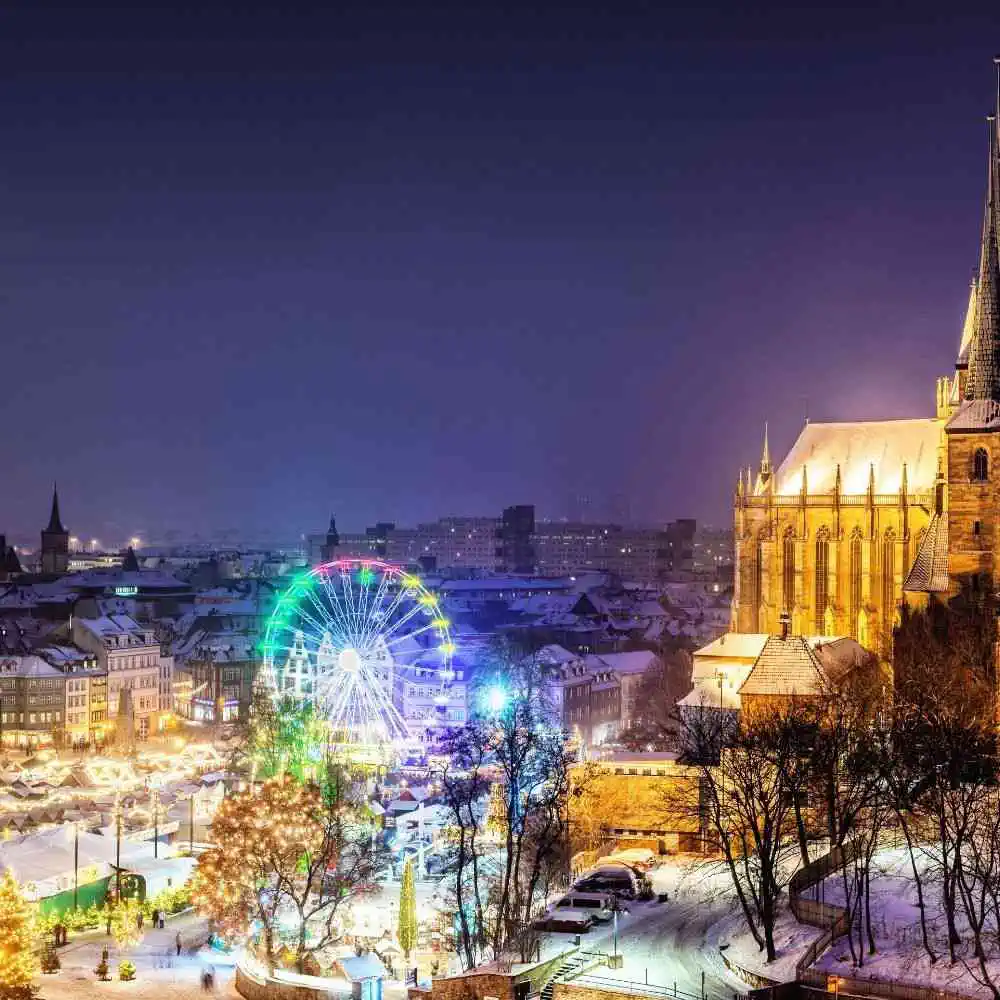Partirás desde Erfurt Hbf, ubicado justo en el centro de la ciudad de Erfurt, y disfrutarás del hermoso paisaje mientras llegas a München Hbf, también situada en el corazón de Múnich.
Trenes de Erfurt a MúnichDesde € 30.00
Trenes de Erfurt a Múnich
Viaje en tren de Erfurt - Múnich
The train departs from Erfurt station and makes its way towards Nuremberg, a city steeped in history with a charming old town and thriving cultural scene. From Nuremberg, the train passes through Ingolstadt, a town known for its centuries-old university and its beautiful castle. On the way to Munich, you'll also pass through Augsburg, a city with an impressive history and an attractive old quarter.
When you arrive at Munich station, you will be treated to the most iconic item of the journey: a stein of foamy Bavarian beer. This beer is often served in a traditional beer mug and is an integral part of Bavarian culture. After a three-hour journey, the experience of Bavarian hospitality paired with a stein of beer will be a perfect way to end your trip.
Traveling by train from Erfurt to Munich is a great way to explore the German countryside, and it's an experience you won't want to miss. With a journey time of three hours, it's easy to fit this trip into your schedule, and you'll get to experience the beautiful Bavarian landscape as you go.

Erfurt: Explora la Ciudad
Erfurt is one of the oldest cities in Germany, located in the heart of the Thuringia province. It has a rich history, full of fascinating architecture, monuments, and culture. A trip to Erfurt promises to offer a unique insight into Germany’s past, with plenty of opportunities to explore and discover. Here are seven of the best places to visit and what to eat when you’re in town.
Church of St. Severus: The Church of St. Severus is the oldest structure in Erfurt, dating back to the 8th century. Its Romanesque and Gothic-style architecture and impressive vaulted ceilings make it truly one of a kind. Entrance to the church is free, and it’s open from 10am to 4pm. Make sure to check out the elaborate altarpiece and the 11th-century baptismal font.
Krämerbrücke: The Krämerbrücke is an iconic bridge in Erfurt with a remarkable history. Built in 1325, the bridge, spanning over the Breitstrom river, contains over 30 quaint, half-timbered houses built during the Middle Ages. Today, many of these houses are filled with small shops selling traditional Thuringian handicrafts and souvenirs.
Erfurt Cathedral & Chapel: This Gothic structure is home to the city’s most important religious buildings. Erfurt Cathedral, built in the 13th century, is an impressive sight, with fascinating artworks and a great view of the city. The Chapel of St. Mary, which dates back to 1490, is another architectural gem and is open from 10am to 5pm.
Merchants' House: One of Erfurt’s oldest homes, the Merchants' House is a delightfully preserved building from the Middle Ages. Located in the heart of the city, the house was originally constructed in the 13th century and remained in the same family until World War II. It now serves as a museum and is open daily from 10am to 5pm.
Fischmarkt: This old-fashioned market square is the ideal spot to pick up some fresh produce and other treats. You’ll find stalls selling all kinds of food, and the local specialties such as Thüringer Rostbratwurst and Thüringer Klöße, a type of dumpling, are a must-try.
Moritzburg Fortress & Museum: Perched on a hill overlooking Erfurt, this magnificent fortress, built in the 14th century, is a sight to behold. It’s now home to a museum of Thuringian history, with a collection of coins, weaponry, and artwork from the Middle Ages. Entrance to the museum is free, open from Tuesday to Sunday between 10am and 4pm.
St. Augustine's Monastery: This stunning Romanesque-style monastery was once the site of Martin Luther’s religious awakening. Today, the monastery houses the university library and is open to visitors from 10am to 4pm.
Erfurt is the perfect destination for anyone looking for an unforgettable trip full of history and culture. Make sure to try some of the city’s delicious traditional dishes and explore its unique architecture. You’re sure to have a memorable experience!

Múnich: Explora la Ciudad
¿Alguna vez has soñado con explorar una ciudad donde la historia y la modernidad se encuentran de manera tan fascinante que cada calle parece contar su propia historia? Múnich, en el corazón de Alemania, es precisamente ese lugar. Desde impresionantes palacios hasta jardines serenos, pasando por la irresistible gastronomía bávara, Múnich promete una aventura inolvidable. A continuación, te presentamos los lugares imperdibles para sumergirte en su rica cultura e historia.
El Marienplatz, la plaza central de la ciudad, es nuestro punto de partida. Aquí, el Neues Rathaus (Nuevo Ayuntamiento) con su famoso carrillón, el Glockenspiel, captura la esencia de Múnich. La mejor hora para visitarlo es a las 11:00 o a las 17:00, cuando el carrillón cobra vida.
La Catedral de Nuestra Señora (Frauenkirche), con sus características torres gemelas, ofrece unas vistas panorámicas impresionantes de la ciudad. La entrada es gratuita, aunque para subir a la torre se aplica una tarifa.
El impresionante Palacio de Nymphenburg, residencia de verano de los antiguos gobernantes de Baviera, te transportará a la opulencia del pasado. No olvides visitar sus extensos jardines.
No puedes irte sin ver el Deutsches Museum, uno de los museos de ciencia y tecnología más grandes del mundo. Es perfecto para familias y curiosos.
El Parque Olímpico, construido para los Juegos Olímpicos de 1972, es ahora un centro de actividades recreativas y culturales, con tours disponibles a diario.
Para los amantes del arte, la Pinakothek ofrece tres museos distintos: Alte (antigua), Neue (nueva) y Moderne (moderna), cada uno con colecciones impresionantes de obras de arte.
Finalmente, el Englischer Garten, uno de los parques urbanos más grandes del mundo, es el lugar perfecto para relajarse después de un día explorando Múnich.
En cuanto a la gastronomía, no puedes dejar Múnich sin probar un auténtico pretzel, acompañado de una tradicional cerveza bávara. Los mercados locales y las cervecerías al aire libre son excelentes lugares para disfrutar de estas delicias.
Recorrer Múnich revela la perfecta armonía entre el pasado y el presente, donde cada rincón tiene su propia magia. Desde palacios que parecen sacados de un cuento de hadas hasta modernas exposiciones de arte, Múnich es una ciudad que te invita a explorarla sin prisa, disfrutando de cada momento y, por supuesto, de cada bocado. Así que, ¿listo para embarcarte en esta aventura?

Erfurt: Estaciones Principales
The main train station of Erfurt, in Germany is Erfurt Hauptbahnhof. This is one of the largest stations in the city, servicing thousands of travelers daily. There are also some other train stations, such as Erfurt West, Erfurt Süd, Erfurt Nord and Steigerwaldbahnhof.
The Erfurt Hauptbahnhof is located at Willy-Brandt-Platz 3, 99084 Erfurt. Opening hours are from 5:00 a.m. to 0:30 a.m. daily. The station has luggage storage facilities with prices ranging from €5.00 to €10.00 per 24 hours. The contact telephone number is +49 361 6511-0.
- Erfurt Hbf
- Erfurt Nord
- Erfurt-Gispersleben
- Erfurt-Bischleben
- Erfurt Ost
Múnich: Estaciones Principales
La estación de tren principal de Múnich, conocida como München Hauptbahnhof, es el núcleo del transporte ferroviario en la vibrante ciudad de Múnich, en Alemania. Esta estación sirve como punto de partida y llegada para numerosos viajes nacionales e internacionales, conectando Múnich con varias ciudades europeas. Además de la Hauptbahnhof, Múnich cuenta con otras estaciones relevantes como München Ost y München Pasing, que facilitan la movilidad dentro y fuera de la ciudad, brindando accesos alternativos a diferentes destinos.
La München Hauptbahnhof se encuentra en Bayerstraße 10A, un punto accesible desde cualquier parte de la ciudad. Su horario de atención se extiende las 24 horas del día, asegurando asistencia continua a los viajeros. Para consultas, se puede contactar al teléfono de contacto. Dentro de la estación, los servicios de consigna de equipajes ofrecen una solución cómoda para guardar las pertenencias de forma segura mientras se explora la ciudad o se espera el próximo tren.
- München Hbf
- München Ost
- München-Pasing
- München Hackerbrücke
Erfurt - Múnich: Consigue las mejores Ofertas
Reserva por adelantado:
Al igual que con las tarifas aéreas, los precios de los boletos de tren tienden a aumentar a medida que se acerca la fecha de salida. Reservar semanas o incluso meses de anticipación puede ahorrarle una cantidad significativa. Viaje durante las horas de menor actividad:
Evite viajar durante las horas pico, como las mañanas y las noches de los días laborables. Opta por los viajes de mediodía, tarde en la noche o de mitad de semana cuando hay menos demanda.
Los trenes expresos o de alta velocidad pueden ahorrar tiempo, pero a menudo son más caros. Optar por servicios regionales o lentos puede reducir su tarifa.
Busque acuerdos y promociones especiales:
Los operadores de trenes ocasionalmente tienen promociones o ofertas especiales, especialmente durante las temporadas fuera de pico. Vale la pena inscribirse en boletines. Además, a veces hay descuentos en boletos de grupo o devolución, así que considere estas opciones si se ajustan a sus planes de viaje.
Todo lo que necesitas saber de
¿Necesitas ayuda?
- Contáctanos
Pago seguro garantizado
Certificados


